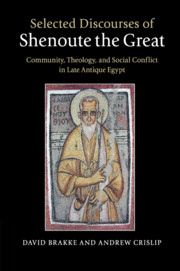 Selected Discourses of Shenoute the Great
Selected Discourses of Shenoute the Great Published online by Cambridge University Press: 05 December 2015
Introduction
Shenoute is most famous among students of late ancient history for his activities as a colorful example of the late antique “holy man” and his vociferous and sometimes violent opposition to the local “pagans.” This latter, and undeniably important, aspect of his career is covered in Part iv of this collection. But Shenoute's anti-pagan rhetoric and activities take place against the background of his broader interest in defending the Church as he understood it against a range of threats – threats that included not only the abuse, “violence,” and “corruption” that so exercises his moral thought, but also errors in doctrine. Such threats for Shenoute – doctrinal and moral – were not necessarily distinct. Nor were threats from heresies, pagans, and others. Part i includes several important works that give a representation of Shenoute's theological apologetics.
Shenoute's engagement with theology and apologetics has been all too easy to overlook or minimize, especially for those approaching the Egyptian monk with the standards of fourth- and fifth-century Greek theologians. He was not, after all, a major player in the theological debates of the fifth century throughout the wider Mediterranean world. He had no readership outside of Egypt and is never mentioned by Greek or Latin sources. Even his visit to the Council of Ephesus in 431 does not bear mention outside Egypt, notwithstanding its importance in Shenoute's Life and in his own writings. He was such a local figure that it has been tempting to separate him off as “Coptic” or “Egyptian,” a category that reflects outmoded conceptions that divide intellectual Greek monks from their purer and more simple-minded (haplōs) Egyptian brethren immortalized in the imaginative world of the Sayings of the Desert Fathers. But Shenoute was deeply engaged in theology, in particular a polemical theology that pointedly defends Alexandrian orthodoxy, from the lineage of Athanasius (ca. 298–373) through Dioscorus (d. 454), against the various enemies inside and outside the Church: Origen and his followers, subordinationist followers of Arius, Nestorius and his allies, Manichaeans, Melitians, Jews, and “pagans” (hellēnes).
Shenoute's staunch defense of Alexandrian orthodoxy and his lengthy polemics against its various enemies inside and outside of the Church are of the sort more typically expected of late ancient bishops, of which Shenoute was not.
To save this book to your Kindle, first ensure no-reply@cambridge.org is added to your Approved Personal Document E-mail List under your Personal Document Settings on the Manage Your Content and Devices page of your Amazon account. Then enter the ‘name’ part of your Kindle email address below. Find out more about saving to your Kindle.
Note you can select to save to either the @free.kindle.com or @kindle.com variations. ‘@free.kindle.com’ emails are free but can only be saved to your device when it is connected to wi-fi. ‘@kindle.com’ emails can be delivered even when you are not connected to wi-fi, but note that service fees apply.
Find out more about the Kindle Personal Document Service.
To save content items to your account, please confirm that you agree to abide by our usage policies. If this is the first time you use this feature, you will be asked to authorise Cambridge Core to connect with your account. Find out more about saving content to Dropbox.
To save content items to your account, please confirm that you agree to abide by our usage policies. If this is the first time you use this feature, you will be asked to authorise Cambridge Core to connect with your account. Find out more about saving content to Google Drive.